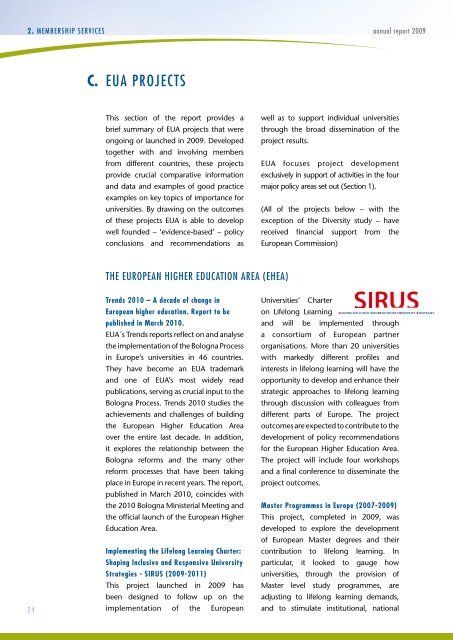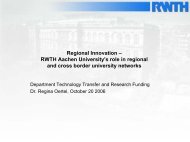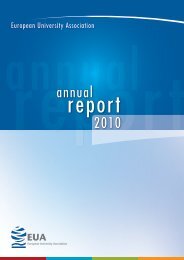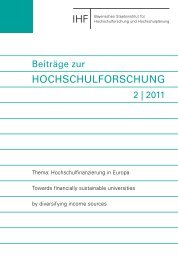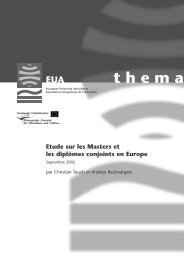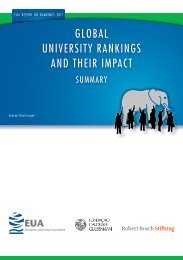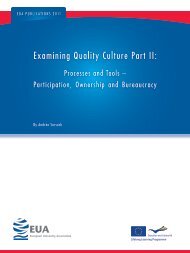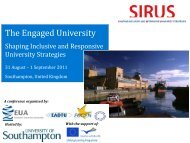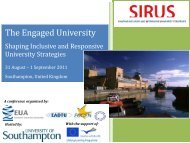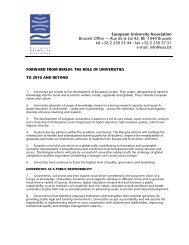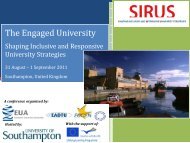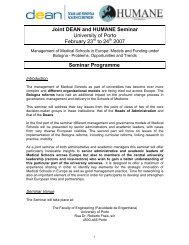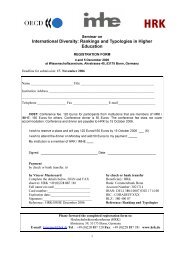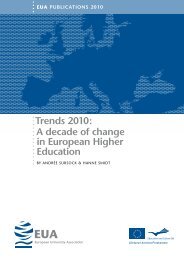English - European University Association
English - European University Association
English - European University Association
Create successful ePaper yourself
Turn your PDF publications into a flip-book with our unique Google optimized e-Paper software.
2. MEMBERSHIP SERVICES<br />
24<br />
C. EUA PROJECTS<br />
This section of the report provides a<br />
brief summary of EUA projects that were<br />
ongoing or launched in 2009. Developed<br />
together with and involving members<br />
from different countries, these projects<br />
provide crucial comparative information<br />
and data and examples of good practice<br />
examples on key topics of importance for<br />
universities. By drawing on the outcomes<br />
of these projects EUA is able to develop<br />
well founded – ‘evidence-based’ – policy<br />
conclusions and recommendations as<br />
THE EUROPEAN HIGHER EDUCATION AREA (EHEA)<br />
Trends 2010 – A decade of change in<br />
<strong>European</strong> higher education. Report to be<br />
published in March 2010.<br />
EUA´s Trends reports refl ect on and analyse<br />
the implementation of the Bologna Process<br />
in Europe’s universities in 46 countries.<br />
They have become an EUA trademark<br />
and one of EUA’s most widely read<br />
publications, serving as crucial input to the<br />
Bologna Process. Trends 2010 studies the<br />
achievements and challenges of building<br />
the <strong>European</strong> Higher Education Area<br />
over the entire last decade. In addition,<br />
it explores the relationship between the<br />
Bologna reforms and the many other<br />
reform processes that have been taking<br />
place in Europe in recent years. The report,<br />
published in March 2010, coincides with<br />
the 2010 Bologna Ministerial Meeting and<br />
the offi cial launch of the <strong>European</strong> Higher<br />
Education Area.<br />
Implementing the Lifelong Learning Charter:<br />
Shaping Inclusive and Responsive <strong>University</strong><br />
Strategies - SIRUS (2009-2011)<br />
This project launched in 2009 has<br />
been designed to follow up on the<br />
implementation of the <strong>European</strong><br />
annual report 2009<br />
well as to support individual universities<br />
through the broad dissemination of the<br />
project results.<br />
EUA focuses project development<br />
exclusively in support of activities in the four<br />
major policy areas set out (Section 1).<br />
(All of the projects below – with the<br />
exception of the Diversity study – have<br />
received fi nancial support from the<br />
<strong>European</strong> Commission)<br />
Universities’ Charter<br />
on Lifelong Learning<br />
and will be implemented through<br />
a consortium of <strong>European</strong> partner<br />
organisations. More than 20 universities<br />
with markedly different profi les and<br />
interests in lifelong learning will have the<br />
opportunity to develop and enhance their<br />
strategic approaches to lifelong learning<br />
through discussion with colleagues from<br />
different parts of Europe. The project<br />
outcomes are expected to contribute to the<br />
development of policy recommendations<br />
for the <strong>European</strong> Higher Education Area.<br />
The project will include four workshops<br />
and a fi nal conference to disseminate the<br />
project outcomes.<br />
Master Programmes in Europe (2007-2009)<br />
This project, completed in 2009, was<br />
developed to explore the development<br />
of <strong>European</strong> Master degrees and their<br />
contribution to lifelong learning. In<br />
particular, it looked to gauge how<br />
universities, through the provision of<br />
Master level study programmes, are<br />
adjusting to lifelong learning demands,<br />
and to stimulate institutional, national


